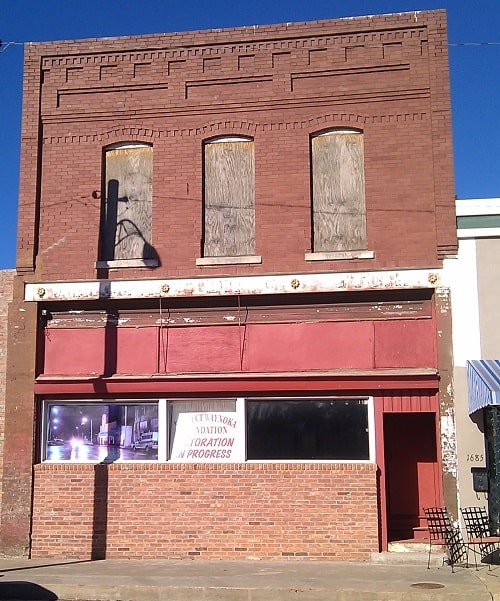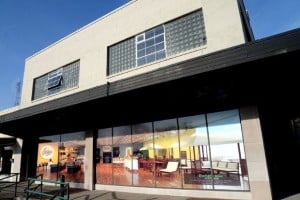
This empty building in Waynoka, Oklahoma, is in luck. The Project Waynoka Foundation has taken it on to renovate. Photo by Becky McCray.
Dina Jackson is with the City of Harriman, in Tennessee, USA. The city government owns 9 vacant properties, including a hospital building and a couple of houses. Rather than hide them, the city decided to show them off. They invited folks to tour the buildings and asked for offers.
“We are now in the process of selling two of those properties,” Dina said.
Several prospective buyers asked Dina what they should do with the buildings or what kind of business their town could support. Dina asked me for some ideas.
The best place to look for new business opportunities is in your retail leakage or gap statistics.
If we can see what your local spend on a category, versus how much of that is spent locally, we can spot opportunities. Look at this example from Waterloo, Illinois. See all those negative numbers? Those are dollars flowing out of the community. Local people are spending in those categories, just not in Waterloo. That means it’s an opportunity. A new business could start in any of those categories, and know that locals are already spending for them. Or an existing business could add new merchandise to meet those needs.
To see a dressed-up version of a gap analysis, look at this one from the City of Spruce Grove, Alberta, Canada, done by a consulting firm. If you want to learn a lot more about gap analysis, check out this paper (PDF) from Oklahoma Cooperative Extension Service. The extension service in Oklahoma provides retail gap analyses, and I’m betting other states have similar services.
Here are a dozen more ideas for filling an empty building:
1. Make a space that multiple businesses can divide and share. It can be a space carefully designed for compatible small retail shops, like Cathy Lloyd shared from Washington, Iowa. One downtown building gives life to many new retail stores. Shared spaces can also include a community of diverse businesses like 1440 Main Street.
Update: Here’s an example from Safety Harbor, Florida, where a building was shared as a co-operative. One building is housing seven retail businesses, all owned by women.
2. Set up a business incubator. Ron Hirst has some suggestions to make incubators work in small towns.
3. Renovate, then lease or sell the building to the city or municipality. That’s how the Project Waynoka Foundation turned an empty building into the downtown library in Waynoka, Oklahoma. Then they used the money to buy another empty building. They renovated it, and then sold it to a business. Then they used that money to buy another empty building. And they’re still going.
4. Think creatively about different uses. Lots of small towns have old school buildings sitting empty. Harveyville, Kansas, made a creative conference space and artistic residences out of an old school. I’ve also heard of school buildings used as a product warehouse, a youth scout council headquarters, a business incubator with commercial kitchen, and work crew housing.
5. Try a pop-up. Set up a temporary store, restaurant, cafe, art gallery, etc., just for the busy season or even one day for a special event. The operator gets to try out an idea, learn from the experience, and maybe get started on a more permanent business. The community gets an idea of what could be possible. And maybe another new entrepreneur gets inspired. Learn more in What is a pop-up business?
6. Create a co-working space. Give a bunch of independent professionals a space they can share whenever they need it. They’ll not only reduce their costs, but they’ll also benefit from the creative interaction and networking. Here’s how Pella, Iowa, started their co-working.
7. Use the upstairs for apartments. Here are some downtown housing resources.
8. Use the upstairs for short term lodging, like Julia did in Buffalo, Oklahoma.
9. Put empty buildings up for sale online to lure urban businesses to relocate. Between communications technology and ever-present shipping services, most businesses can be done from anywhere. And your cost per square foot is much less than any big urban area. That makes you potentially competitive. Gaylord, Kansas, did this back in 2006.
Is your building in bad shape?
Even if it’s not ready to occupy, it doesn’t have to just sit there.
10. Rent the front window to another store for a window display. I saw this in my big town of Alva, Oklahoma.
11. Clean it up, dress it up, put up lights. Chris Van Patten told me about a building in Buffalo, New York, that put up lights for the holidays, and promptly sold.
12. Show what it could be. Paint the windows so it looks like a we’re looking into a real business. (Don’t want it on the windows? Paint on paper and hang it inside the windows.) Or get an artist or architect to draw what the building could look like with different businesses there. Put the drawings on display in the front window.
Here’s an example from Longview, Texas. Decals were put on the windows of vacant building to show a 3D view of what the buildings could house, like a hardware store or a furniture store. The $3,000 project was paid for with funds raised in a color run.
13. Missing the roof? Convert it to an outdoor space. Here are 19 ideas for using a roofless building in a productive way, including photos and examples from real small towns. Everything from a bocce ball court to a beer garden is possible.
Getting Up To Code
Getting buildings up to code and usable can be truly expensive. If the code requirements turn out to be ridiculous, as they sometimes are, you might look into alternative codes for historic properties and reuse of existing structures. If your municipal government is willing to work with you, maybe they’ll allow use of one of these codes designed specifically for older buildings.

More ways to fill buildings: 101 Ways to Start More Tiny Businesses
If you need more business ideas, 101 Ways to Start More Tiny Businesses is a short ebook detailing ways to spread economic opportunity as well as why tiny businesses matter. Sign up here to download it and you’ll also get our weekly newsletters where Deb Brown and I share practical steps you can put into action right away to shape the future of your town. Download 101 Ways here.
I will never sell or rent your email address to anyone else because I wouldn’t like that either.












Loved this post Becky (well, I love all your post but this one is perfect right now). We just relocated our family from the West Coast to a small town in the middle of Alabama. The town is RICH in history and currently has a seasonal draw for Field Trials and the Theater and that’s it. We fell in love with the history, the historic buildings and charm (and cost of living). I will eventually relaunch my business here but in the meantime, I am working together with a couple of the business owners in the Historic District to build a Business Owner group dedicated (at first) to the businesses on the downtown street in hopes of generating some enthusiasm to improve the facades, update signage and make it more appealing for RETAIL businesses to want to come and set up shop. There are a few buildings that are vacant (for sale) and in dire need of some love but there is tons of potential! Many of the buildings have second and third stories that would be fabulous housing but …. There are several groups in town (Chamber, Tourism, Historic and Development) but there seems to be tension that prevents everyone from working together therefore no progress is made. I listen, observe, attend meetings, etc. to form my own thoughts rather than go by what one person says. I have no interest in getting into the “politics” of the town (because if you are “in it”, you can’t see it from the outside) but I would love to volunteer my time and services to help bring everyone together and build a profitable town that is more than just what it is now. Any suggestions?
Thank you, Amber. Glad we are helpful. You might like what Deb Brown is doing in Iowa. She is bringing in students from the university to design updated signs and facades for local businesses. The business doesn’t have to implement the designs, but some will! I’ll ask Deb to share more about it.
How do you get different groups working together when you have no authority over them? You do start with listening, like you mentioned. Then you launch a small project that makes it easy for them to join in. Even just flower baskets! Just start. It’s easier to get them to join when you’re rolling forward, I think.
Aside from the ideas already presented here, small towns are actually a great venue for small business. It is all about finding a niche and a desperate need in that town. Since it’s small, it is most likely available. This can help you have a stronghold on the market in that specific location – thus, giving you the perfect business idea.
Ivan, I agree that small towns are a great venue for small business. But it’s far from perfect.
Unfortunately, most small towns are in financial trouble and cannot afford to buy buildings, or even lease them. But one thing not mentioned is soliciting the nonprofit sector, and utilizing the creataive talent pool, and the tax advantages the building owner may receive. Many nonprofits have access to grant funding for makeovers that will improve the building, neighborhood, and the town. This can be win-win for the city, community, agency, and property owners.
Bill, most of the suggestions above do not require the town itself to buy the building. Only one involved leasing by the town. While grant funds are more scarce than ever, tax credits are still feasible.
Today, I was just re-reading some of Dan Carmody’s comprehensive work on upstairs downtown spaces and how to redevelop them. It can be a long and difficult process, but many small towns have managed successful redevelopment projects. As you say, it can be a win for the whole community.
I am from the southernmost town in Africa and you can find us on http://www.southernstaying.co.za under the towns Agulhas and Struisbaai.
I find small town communities are very inclusive and reluctant to change. Understanding the reasons may very well put you on the inside track to find the right business
However, investors are often chasing big profits. Nothing wrong with that. But they often miss fantastic opportunities to make a difference and to help others in particular the small town diamonds.
Do not forget that small towns offer often cheap accommodation that can serve as the HQ of a company especially if the company operates globally.
Warm regards
Johan van Zyl
Also CEO of http://www.worldsolutions.co.za